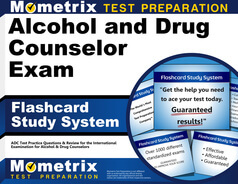Standards and the development of examinations for the credentialing and licensing of professionals working in prevention, substance use treatment, and recovery is the responsibility of the International Certification and Reciprocity Consortium (IC&RC). The IC&RC administers the Alcohol and Drug Counselor (ADC) credential is an entry-level credential that covers the basics of addiction counseling.
Click “Start Test” above to take a free Alcohol and Drug Counselor Practice Test!
Exam Eligibility
To be eligible to take the ADC exam, you will need to check with your local IC&RC Member Board to determine the exact requirements. Each Member Board creates its own eligibility requirements and processes for registration.
ADC Exam Outline
The ADC exam contains 150 multiple-choice questions, 25 of which are not counted toward your final score, and the time limit set for this exam is 3 hours. It is important to note that there is no penalty to guessing, as your final score is determined by how many questions you answered correctly.
The exam is split into four domains:
- Scientific Principles of Substance Use and Co-occurring Disorders (25%)
- Evidence-based Screening and Assessment (20%)
- Evidence-based Treatment, Counseling, and Referral (30%)
- Professional, Ethical, and Legal Responsibilities (25%)
Check out Mometrix's Alcohol and Drug Counselor Study Guide
Get practice questions, video tutorials, and detailed study lessons
Get Your Study Guide
Test Day
All tests are administered by ISO-Quality Testing, Inc. which has locations throughout the world. On test day, you will be asked to provide your Candidate Admission Letter and a valid, government-issued photo ID. It is very important to note that you will not be able to take the exam unless you bring your ID and Candidate Admission Letter. If you fail to bring the necessary items, you will be considered a “no-show,” your examination fees will be forfeited, and you will be required to re-register and re-pay all fees if you wish to schedule another appointment.
You will not be allowed to take any electronic devices (including your cell phone) into the testing room, and you will not be allowed to bring or use any reference materials.
How the Test is Scored
The ADC exam is scored on a scale of 200-800, and you must achieve a score of at least 500 to pass. You will be provided a preliminary score report immediately after you finish the exam, but official score reports will be available within 2-3 weeks.
If you fail the exam, you will be given a score report that includes percentages of the items you answered correctly in each domain. This is provided to you so you can structure a focused study regime if you wish to take the test again. If you do wish to retake the exam, you must wait 90 days.
Check out Mometrix's Alcohol and Drug Counselor Flashcards
Get complex subjects broken down into easily understandable concepts
Get Your Flashcards

Study Tips
How to Study Effectively
Your success on Alcohol and Drug Counselor test day depends not only on how many hours you put into preparing but also on whether you prepared the right way. It’s good to check along the way to see whether your studying is paying off. One of the most effective ways to do this is by taking Alcohol and Drug Counselor practice tests to evaluate your progress. Practice tests are useful because they show exactly where you need to improve. Every time you take a free Alcohol and Drug Counselor exam practice test, pay special attention to these three groups of questions:
- The questions you got wrong
- The ones you had to guess on, even if you guessed right
- The ones you found difficult or slow to work through
This will show you exactly what your weak areas are and where you need to devote more study time. Ask yourself why each of these questions gave you trouble. Was it because you didn’t understand the material? Was it because you didn’t remember the vocabulary? Do you need more repetitions on this type of question to build speed and confidence? Dig into those questions and figure out how you can strengthen your weak areas as you go back to review the material.
Answer Explanations
Additionally, many ADC practice tests have a section explaining the answer choices. It can be tempting to read the explanation and think that you now have a good understanding of the concept. However, an explanation likely only covers part of the question’s broader context. Even if the explanation makes sense, go back and investigate every concept related to the question until you’re positive you have a thorough understanding.
Comprehend Each Topic
As you go along, keep in mind that the ADC practice test is just that: practice. Memorizing these questions and answers will not be very helpful on the actual test because it is unlikely to have any of the same exact questions. If you only know the right answers to the sample questions, you won’t be prepared for the real thing. Study the concepts until you understand them fully, and then you’ll be able to answer any question that shows up on the test.
Strategy for ADC Practice
When you’re ready to start taking practice tests, follow this strategy:
- Remove Limitations. Take the first test with no time constraints and with your notes and Alcohol and Drug Counselor study guide handy. Take your time and focus on applying the strategies you’ve learned.
- Time Yourself. Take the second practice test “open book” as well, but set a timer and practice pacing yourself to finish in time.
- Simulate Test Day. Take any other practice tests as if it were test day. Set a timer and put away your study materials. Sit at a table or desk in a quiet room, imagine yourself at the testing center, and answer questions as quickly and accurately as possible.
- Keep Practicing. Keep taking practice tests on a regular basis until you run out of practice tests or it’s time for the actual test. Your mind will be ready for the schedule and stress of test day, and you’ll be able to focus on recalling the material you’ve learned.
ADC Online Prep Course
If you want to be fully prepared, Mometrix offers an online ADC prep course designed to give you everything you need to succeed!
Here’s what you’ll find in the ADC course:
- 60+ Review Lessons Covering Every Topic
- 600 ADC Practice Questions
- 400+ Digital Flashcards
- Money-back Guarantee
- Mobile Access
Everyone learns differently, so we’ve tailored the ADC online prep course to ensure every learner has what they need to prepare for the ADC exam.
Click below to check it out!
FAQs
Q
How many questions are on the ADC exam?
A
There are 150 questions on the exam, though only 125 of the questions will count toward your final score.
Q
How long is the ADC exam?
A
The exam is timed at 3 hours.
Q
What is a passing score for the ADC exam?
A
A passing score for the exam is 500.
Q
How much does the ADC exam cost?
A
The cost of the exam will vary depending on where you take it.
Mometrix Test Preparation is not affiliated with or endorsed by any official testing organization. All organizational and test names are trademarks of their respective owners.


